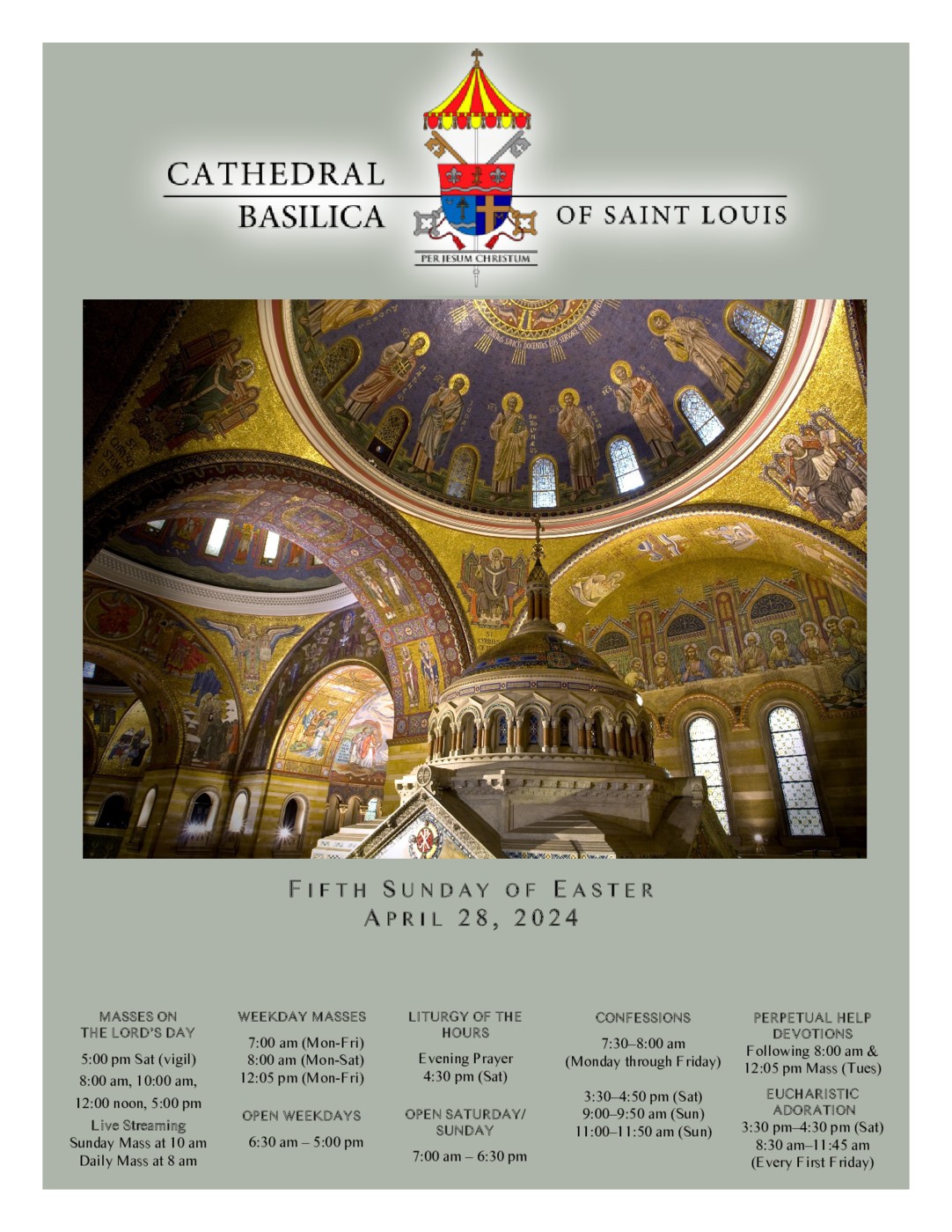Bulletins, Newsletters, and Flocknotes

We want to stay connected.
You need the most up-to-date information, and we want to give it to you.
If you attended Mass elsewhere and need a Bulletin, you can easily find it here organized by date. If you changed your email address and didn't get a Flocknote or a newsletter, you can find what you missed here.
Vatican News
In May, Vatican to offer special Marian tour of Pope's gardens
May 1, 2024 - 8:02amFor the month of May, which is dedicated to the Virgin Mary, the Vatican Museums are offering a tour of the Pope’s gardens every Wednesday and Saturday dedicated to Marian spirituality.
Blinken in push for Gaza peace deal
May 1, 2024 - 8:02amOn the third day of his Middle East tour, America’s top diplomat – Anthony Blinken – has been meeting with Israeli Prime Minister, Benjamin Netanyahu, in Jerusalem.
Archbishop of Canterbury Justin Welby endorses Rome Call for AI ethics
May 1, 2024 - 5:24amThe Archbishop of Canterbury endorses the "Rome Call" effort for ethical development of artificial intelligence, saying “Let us all work to ensure that the dignity of every human being, created by God, not for profit or productivity, is central to all we do.”
Upholding the dignity of workers and eradicating child labour
May 1, 2024 - 4:07amThe 1 May is marked annually as International Workers Day, also known as Labour Day. It is a day in which workers are celebrated for their presence, contribution and achievements in society.
Pope denounces arms industry and condemns profitting from death
May 1, 2024 - 3:09amPope Francis prays for victims of war in Ukraine, Palestine, Israel, and Myanmar, highlighting how, unfortunately, the most profitable investments are those linked to the arms industry.
Parish Flocknote
Annual Catholic Appeal 2024
April 27, 2024 - 2:00pmWhen Jesus gathered with His disciples at the Last Supper, He left us His greatest gift in the Eucharist “for the life of the world” (Jn 6:51). It is Christ’s sacrifice that inspires us to make sacrifices of our own to...Weekly Update
April 26, 2024 - 2:00pmSchedule for April 27-28 Saturday, April 27 Remember St. Louis Marathon is this morning 7:00 am Cathedral Open for Private Prayer and Devotion 8:00 am Mass - 1:30 pm Confirmation 3:30 - 4:30 pm Holy Hour - concluding with Evening...Saturday, April 27 - Marathon
April 23, 2024 - 2:00pmDear Parishioners, This Saturday, April 27th, the St. Louis Go Marathon will take place and will significantly impact the Cathedral Basilica. The start time for the Marathon in downtown St. Louis is 7:00 a.m., and part of the...Rosemary Shaughnessy
April 22, 2024 - 8:41amShaughnessy, Rosemary Elizabeth Fortified with the Sacraments of Holy Mother Church and resting in the Arms of the Holy Family, died on April 16, 2024. Beloved wife of Joseph Francis Shaughnessy, dear mother of seven, Ellen...Divine Mercy Sunday
April 4, 2024 - 2:00pmOn Sunday, April 7, 2024, we celebrate the Feast of Divine Mercy, a feast day added to the liturgical calendar by St. John Paul II to celebrate the overwhelming mercy of Jesus Christ. In recognition of this very special day, the...
National Catholic Register
Pro-Life Roundup: Here’s What Happened With Abortion at the State Level This Week
May 1, 2024 - 6:02pm The pro-life flag from the Pro-Life Flag Project (www.prolifeflag.com).
The pro-life flag from the Pro-Life Flag Project (www.prolifeflag.com).
Pro-life laws came into effect in Florida and Tennessee, as pro-abortion developments were seen in Arizona, South Dakota and Maine.
Latin Patriarch of Jerusalem Takes Possession of Rome Titular Church After Delays Due to War
May 1, 2024 - 5:47pm Daniel Ibáñez
Cardinal Pierbattista Pizzaballa gives the homily at a Mass in which he took possession of his titular church, St. Onuphrius, in Rome on May 1.
Daniel Ibáñez
Cardinal Pierbattista Pizzaballa gives the homily at a Mass in which he took possession of his titular church, St. Onuphrius, in Rome on May 1.
‘We are going through the most difficult moments in our history,’ Cardinal Pierbattista Pizzaballa said at the May 1 Mass.
Archdiocese of Baltimore Concludes Traumatic ‘Listening Sessions’ Around Restructuring Plan
May 1, 2024 - 5:28pm Matthew Balan
Catholics in the Archdiocese of Baltimore pack the Cathedral of Mary, Our Queen during a concluding listening session on the archdiocese's major parish restructuring plan on April 30.
Matthew Balan
Catholics in the Archdiocese of Baltimore pack the Cathedral of Mary, Our Queen during a concluding listening session on the archdiocese's major parish restructuring plan on April 30.
The proposal is to shrink the city’s parishes from 61 parishes to 26 parishes.
Archdiocese of New Orleans Suspected of Child Sex Trafficking, Warrant Shows
May 1, 2024 - 5:03pm SNEHIT PHOTO
The St. Louis Cathedral, the oldest Catholic cathedral in continual use in the United States, on April 9, 2020, in New Orleans.
SNEHIT PHOTO
The St. Louis Cathedral, the oldest Catholic cathedral in continual use in the United States, on April 9, 2020, in New Orleans.
One document cited in the affidavit states that one specific archbishop 'was aware of rampant sexual abuse throughout the archdiocese,' but the affidavit leaves out the archbishop’s name.
Here Are the Countries That Rank Worst in the World in Religious Freedom
May 1, 2024 - 4:58pm Paolo Costa
Candles burn inside a Catholic church.
Paolo Costa
Candles burn inside a Catholic church.
Here are some of the countries with the most concerning religious freedom trends in the last year.






